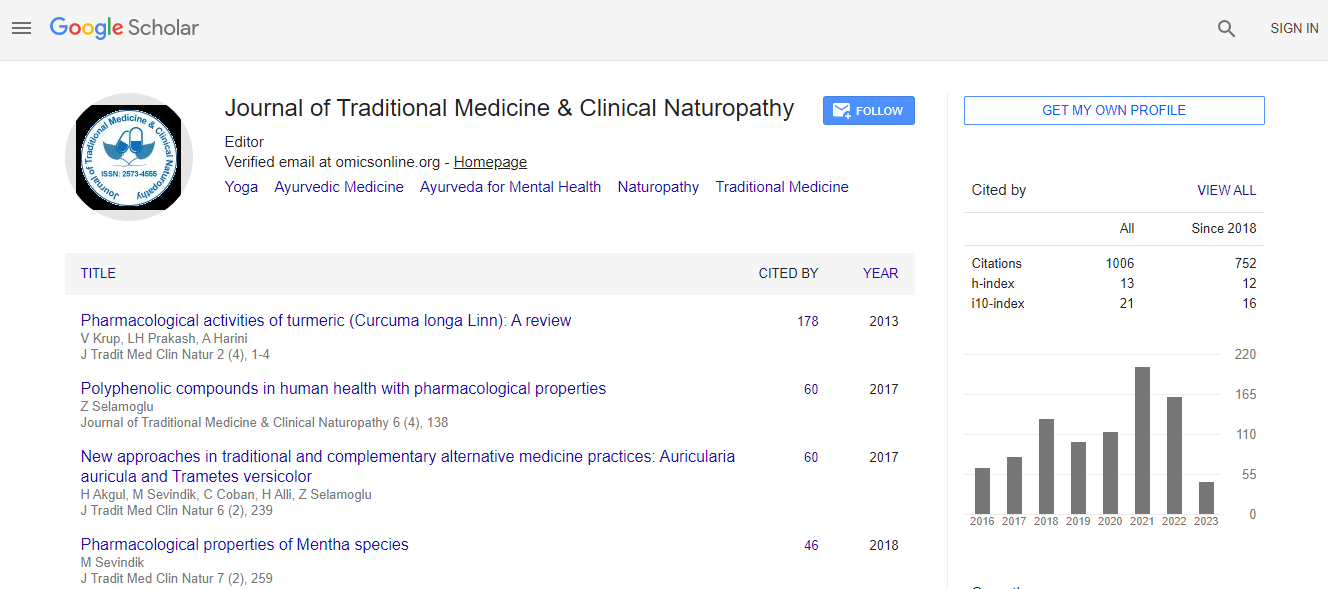Our Group organises 3000+ Global Conferenceseries Events every year across USA, Europe & Asia with support from 1000 more scientific Societies and Publishes 700+ Open Access Journals which contains over 50000 eminent personalities, reputed scientists as editorial board members.
Open Access Journals gaining more Readers and Citations
700 Journals and 15,000,000 Readers Each Journal is getting 25,000+ Readers
Google Scholar citation report
Citations : 1504
Journal of Traditional Medicine & Clinical Naturopathy peer review process verified at publons
Indexed In
- CAS Source Index (CASSI)
- Google Scholar
- Sherpa Romeo
- Open J Gate
- Genamics JournalSeek
- RefSeek
- Directory of Research Journal Indexing (DRJI)
- Hamdard University
- EBSCO A-Z
- Publons
- Geneva Foundation for Medical Education and Research
- Euro Pub
- ICMJE
Useful Links
Recommended Journals
Related Subjects
Share This Page
Integrating ayurveda in mainstream health care system: Challenges and drivers
10th International Conference on Medicinal Practices: Herbal, Holistic
Atul Sharma, Prashant Narang
Haleon, India
ScientificTracks Abstracts: J Tradit Med Clin Natur
Abstract
Background â�?¢ Post COVID-19, focus on natural/ayurvedic products (especially those improving immunity and wellbeing)1 has increased substantially (from ~15-20% to ~50-90%). â�?¢ Ayurveda occupies 70% of Indian formal drugs market and would have a global worth of ~5 trillion USD by 2050.4,5 However, its adoption trajectory is still moderate. â�?¢ Thus, itâ�?�?s essential to comprehend the drivers that can enhance global-acceptance of ayurveda considering its perceived positive benefit-risk profile as naturals. Aim Opinions of Indian experts were collated in the form of survey from the open-discussion forum on Ayurvedic ingredients to: â�?¢ Understand consumers & health practitioners' acceptance of ayurvedic ingredients & practices â�?¢ Discuss challenges and drivers for integrating & enhancing Ayurveda into mainstream healthcare-systems worldwide based on expert opinion and published literature. Results â�?¢ Acceptance of ayurvedic products: The popularity of Ayurveda is mainly due to its therapeutic efficiency against most chronic conditions such immunity, musculoskeletal and joint pain problems, stress management, etc. with a very good safety profile. â�?¢ According to >50% of experts, ayurveda's global reach has been halted due to lack of published clinical studies, quality healthcare infrastructure, government investments, and awareness. â�?¢ The Ayurveda industry's development trajectory is still moderate despite having a significant edge over contemporary treatments due to several reasons. â�?¢ Ayurveda can be incorporated into mainstream healthcare systems by receiving accreditation, regulatory harmonization across geographies, standardizing formulations, digitizing services, promoting scientific research, and establishing robust quality control mechanisms at par with current global standards of healthcare.Biography
Dr. Atul Sharma is an expert medical professional with span of over 16 years of pharmaceutical industry experience in medical affairs across therapeutic areas with leading MNC's in Diabetes, Cardiovascular, Neurology, Psychiatry, Pain, Respiratory, Oral health, Obstetrics & Gynecology & Nutrition. He has been involved in handling medical affairs managers, product development, clinical development, R&D/innovation teams, across geographies of India, Bangladesh, Sri Lanka to achieve organizational growth. He has built strong relationship with National and International universities/academia, government, and medical bodies that allow him to develop an in-depth understanding for required integrative association between the traditional/herbal medicine and modern health-care system for the betterment of human wellbeing.

 Spanish
Spanish  Chinese
Chinese  Russian
Russian  German
German  French
French  Japanese
Japanese  Portuguese
Portuguese  Hindi
Hindi 
